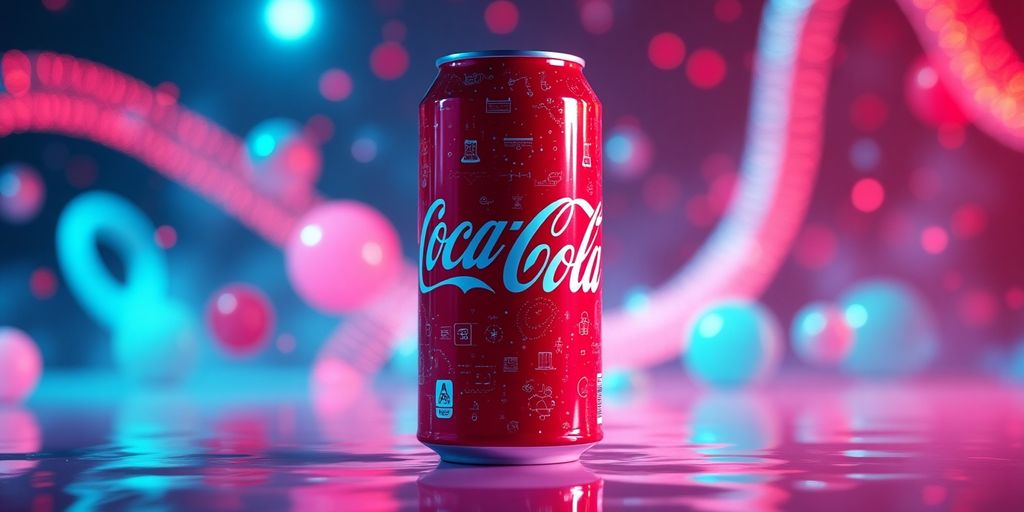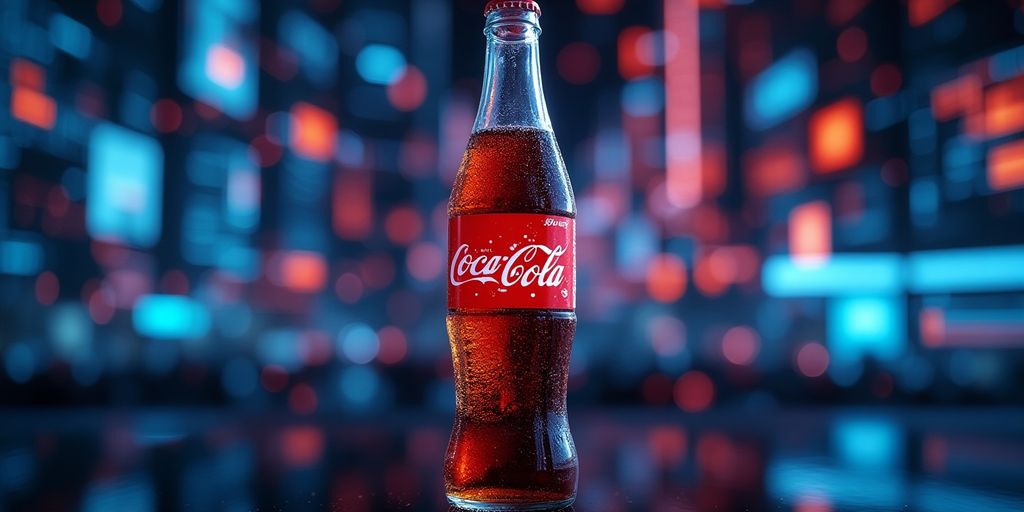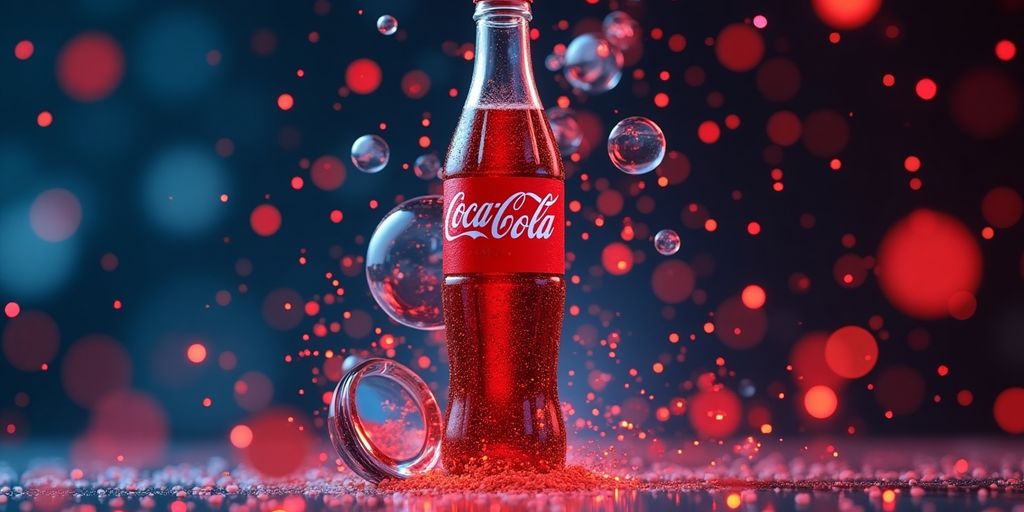Coca-Cola has taken a bold step into the future of advertising by using artificial intelligence (AI) to create its latest holiday ad. This innovative approach not only showcases the brand’s commitment to modernization but also raises important questions about the role of AI in creative industries. As we explore the Coke AI ad, we will uncover its evolution, the challenges it faces, and the impact it may have on consumer engagement and the marketing landscape.
Table of Contents
Key Takeaways
- Coca-Cola’s AI ad represents a major shift in advertising techniques, blending technology with creativity.
- The campaign generated numerous localized versions to resonate with different markets, showcasing AI’s adaptability.
- Concerns over job loss in creative fields have emerged alongside excitement for AI’s potential in enhancing marketing.
- Coca-Cola aims to balance human creativity with AI’s efficiency, believing both can coexist in advertising.
- The future of marketing may see more brands adopting AI, leading to a transformation in how ads are created and perceived.
The Evolution of Coke AI Ad Campaign
From Concept to Creation
Coca-Cola has taken a bold step in its marketing strategy by fully embracing AI technology for its latest holiday campaign. The iconic ad, known as “Holidays Are Coming,” has been reimagined using artificial intelligence, marking a significant shift in how the brand approaches advertising. This campaign not only showcases Coca-Cola’s commitment to innovation but also reflects a broader trend of AI integration across its global operations.
Key Players in the AI Transformation
The success of this campaign can be attributed to a dedicated team of AI innovators. This team includes experts like Mouad Bakhchane, Emily Smith, Jessica Brown, and Michael Williams, who have worked tirelessly to bridge the gap between AI complexity and everyday ease. Their unique skills have made AI more accessible and relatable, allowing Coca-Cola to enhance its creative processes.
Technological Innovations Behind the Ad
The technological advancements that enabled this transformation include:
- Generative AI tools that allow for rapid content creation.
- Customization features that tailor ads to specific markets, resulting in 110 different versions of the ad.
- AI-driven insights that help understand consumer preferences and behaviors.
The integration of AI in Coca-Cola’s advertising strategy is a clear indication of how technology can enhance creativity while maintaining the brand’s essence.
This innovative approach not only aims to engage audiences in new ways but also sets a precedent for future advertising campaigns in the industry. The Coke AI Ad is a testament to the potential of AI in reshaping marketing strategies for the better.
Challenges and Criticisms of AI in Advertising
As Coca-Cola embraces AI in its advertising, it faces several challenges and criticisms that reflect broader concerns in the industry.
Concerns Over Job Displacement
Many people worry that using AI in advertising could lead to job losses in creative fields. Some of the main concerns include:
- Job Replacement: AI tools might take over roles traditionally held by humans, such as animators and designers.
- Skill Erosion: As AI becomes more common, there may be less demand for human creativity and skills.
- Economic Impact: The shift towards AI could affect the job market, leading to fewer opportunities for creatives.
Debate on Artistic Integrity
Critics argue that AI-generated content in Coke AI Ad, lacks the emotional depth and authenticity that human artists bring. Key points in this debate include:
- Lack of Soul: Many believe that AI cannot replicate the unique touch of human creativity.
- Authenticity Issues: The use of AI raises questions about what makes advertising genuine and relatable.
- Cultural Disconnect: AI may not fully understand cultural nuances, leading to ads that miss the mark.
Public Reactions to AI-Driven Ads
The public’s response to AI in advertising has been mixed, with various opinions emerging:
- Excitement for Innovation: Some consumers appreciate the novelty and efficiency that AI brings to advertising.
- Skepticism: Others are wary of AI’s role in creative processes, fearing it may diminish the human element.
- Calls for Balance: Many advocate for a balance between AI and human creativity to maintain the essence of advertising.
The rise of AI in advertising is a double-edged sword, offering both opportunities for innovation and challenges that must be addressed. Coca-Cola’s journey with AI highlights the need for careful consideration of its impact on creativity and employment.
The Role of AI in Enhancing Creativity

AI as a Tool for Creative Expansion
AI is changing how we think about creativity in advertising. It helps marketers explore new ideas and speeds up the creative process. Here are some ways AI is making a difference:
- Faster Production: AI can generate multiple versions of an ad quickly, allowing for more options.
- Customization: AI can tailor ads to specific markets, making them more relevant to local audiences.
- Data-Driven Insights: AI analyzes consumer data to help create ads that resonate with viewers.
Balancing Human and Machine Input
While AI is a powerful tool, it’s important to remember that human creativity is still essential. The best results come from a mix of both:
- Human Vision: Creatives bring unique ideas and emotions that AI cannot replicate.
- AI Support: AI can handle repetitive tasks, freeing up time for humans to focus on big ideas.
- Collaboration: Working together, humans and AI can create ads that are both innovative and meaningful.
Case Studies of Successful AI Integration
Several brands have successfully integrated AI into their advertising strategies. Here are a few examples:
- Coca-Cola: Their recent holiday ad used AI to create 110 different versions, showcasing local landmarks.
- Nike: They use AI to personalize marketing messages based on consumer behavior.
- Netflix: AI helps them recommend shows to viewers, enhancing user experience.
AI is not here to replace creativity; it’s here to enhance it. By combining the strengths of both, we can create advertising that truly connects with people.
In conclusion, AI is a valuable tool in the creative process, but it works best when paired with human insight and emotion. As technology continues to evolve, the partnership between AI and human creativity will likely lead to even more exciting innovations in advertising.
Coca-Cola’s Broader AI Strategy

Coke AI Ad is not just experimenting with AI; it is embracing a comprehensive strategy to integrate AI into various aspects of its business. This approach includes:
AI Beyond Advertising
- Personalized Experiences: Coke AI Ad has introduced interactive features, such as QR codes on holiday products, allowing consumers to engage with digital avatars.
- Smart Vending Machines: The company has transformed its vending machines into data-gathering devices, enhancing customer interaction and sales.
- AI-Driven Platforms: Collaborations with tech firms have led to the creation of platforms that utilize AI for marketing and consumer engagement.
Collaborations with Tech Giants
- In 2023, Coca-Cola partnered with OpenAI and Bain & Company to enhance its AI capabilities.
- This partnership resulted in the development of the Create Real Magic platform, which combines advanced AI technologies to create engaging consumer experiences.
- The collaboration aims to leverage AI for better marketing strategies and operational efficiency.
Future Prospects of AI in Coca-Cola
- Coca-Cola is continuously exploring new ways to integrate AI into its operations, from marketing to product development.
- The company is focused on using AI to gather insights about consumer preferences, which can inform future product offerings.
- As AI technology evolves, Coca-Cola aims to stay at the forefront of innovation in the beverage industry, ensuring it meets the changing needs of consumers.
Coca-Cola’s commitment to AI reflects its desire to redefine its brand in the digital age, ensuring it remains relevant and engaging for consumers worldwide.
This broader strategy highlights how Coca-Cola is leveraging coca cola ai to enhance its marketing efforts and improve consumer engagement, making it a leader in the use of technology in the beverage industry.
Impact of AI on Consumer Engagement

Personalized Marketing Experiences
AI technology has transformed how brands connect with consumers. Coca-Cola, for instance, uses AI to create personalized marketing experiences that resonate with individual preferences. Here are some key ways AI enhances personalization:
- Tailored Recommendations: AI analyzes consumer data to suggest products based on past purchases.
- Dynamic Content: Ads can change in real time to match the viewer’s interests.
- Targeted Campaigns: Brands can reach specific demographics with customized messages.
AI-Driven Consumer Insights
Understanding consumer behavior is crucial for effective marketing. AI tools help Coca-Cola gather valuable insights:
- Data Analysis: AI processes large amounts of data to identify trends and patterns.
- Feedback Loops: Continuous learning from consumer interactions improves future marketing strategies.
- Social Media Monitoring: AI tracks online conversations to gauge public sentiment about products.
Enhancing Brand Loyalty Through Technology
AI not only attracts new customers but also helps maintain loyalty among existing ones. Here’s how:
- Engagement: Interactive AI features keep consumers engaged with the brand.
- Customer Support: AI chatbots provide instant assistance, improving customer satisfaction.
- Loyalty Programs: AI can optimize rewards based on consumer behavior, making programs more appealing.
By leveraging AI, Coca-Cola is not just enhancing consumer engagement; it is also redefining the relationship between brands and their customers. AI-driven strategies are paving the way for a more connected and personalized marketing landscape.
The Future of AI in Marketing

As we look ahead, the role of AI in marketing is set to grow significantly. AI is fundamentally reshaping marketing, offering more efficient, personalized, and data-driven approaches to customer engagement. Here are some key predictions for the future:
Predictions for AI’s Role in Advertising
- Increased Personalization: AI will enable brands to create highly personalized marketing experiences tailored to individual preferences.
- Enhanced Data Analysis: Marketers will leverage AI to analyze vast amounts of data, leading to better decision-making and strategy development.
- Automation of Campaigns: Routine tasks in campaign management will be automated, allowing marketers to focus on creative aspects.
Potential for Industry-Wide Transformation
- Job Evolution: While some jobs may be replaced, new roles will emerge that focus on managing and interpreting AI tools.
- Creative Collaboration: AI will work alongside human creativity, enhancing the creative process rather than replacing it.
- Broader Accessibility: Smaller brands will gain access to advanced marketing tools, leveling the playing field in the industry.
Balancing Innovation with Tradition
- Maintaining Authenticity: Brands will need to find ways to keep their messaging authentic while embracing new technologies.
- Consumer Trust: Building trust with consumers will be crucial as AI becomes more integrated into marketing strategies.
- Ethical Considerations: Companies must navigate the ethical implications of using AI in advertising, ensuring transparency and fairness.
The future of marketing is bright with AI, but it requires a careful balance between innovation and the human touch that consumers value.
Conclusion
Coca-Cola’s use of AI in its holiday advertising has opened up important discussions about how technology, creativity, and tradition mix. Some people find this change exciting, while others worry that AI might take away the personal touch that makes holiday ads special. As this conversation continues, it’s clear that advertising is changing, and AI will likely play a bigger role in the future. The challenge will be to find a way to keep the magic of human creativity while embracing new technology.
Frequently Asked Questions
What is Coca-Cola’s AI ad campaign about?
Coca-Cola’s AI ad campaign is a new way of creating advertisements using artificial intelligence. It aims to modernize their classic holiday ads by making them more personalized and relevant to today’s audiences.
How did Coca-Cola use AI in their holiday ad?
The holiday ad was created with the help of AI, which allowed the team to produce many different versions quickly. This technology helped bring fresh ideas to life while still keeping the spirit of the original ad.
What are some concerns about using AI in advertising?
Some people worry that using AI might take away jobs from human workers, especially in creative fields like animation and design. There are also questions about whether AI can capture the true emotions that human artists can.
How does Coca-Cola view the role of AI in creativity?
Coca-Cola sees AI as a tool that can help enhance creativity rather than replace it. They believe that combining human ideas with AI can lead to even better advertisements.
What are the public reactions to Coca-Cola’s AI ad?
Reactions have been mixed. Some people are excited about the innovation, while others feel that AI lacks the warmth and personal touch that traditional ads have.
What is the future of AI in marketing according to Coca-Cola?
Coca-Cola believes that AI will continue to play a big role in marketing. They are exploring more ways to use AI to engage with consumers and improve their advertising strategies.
